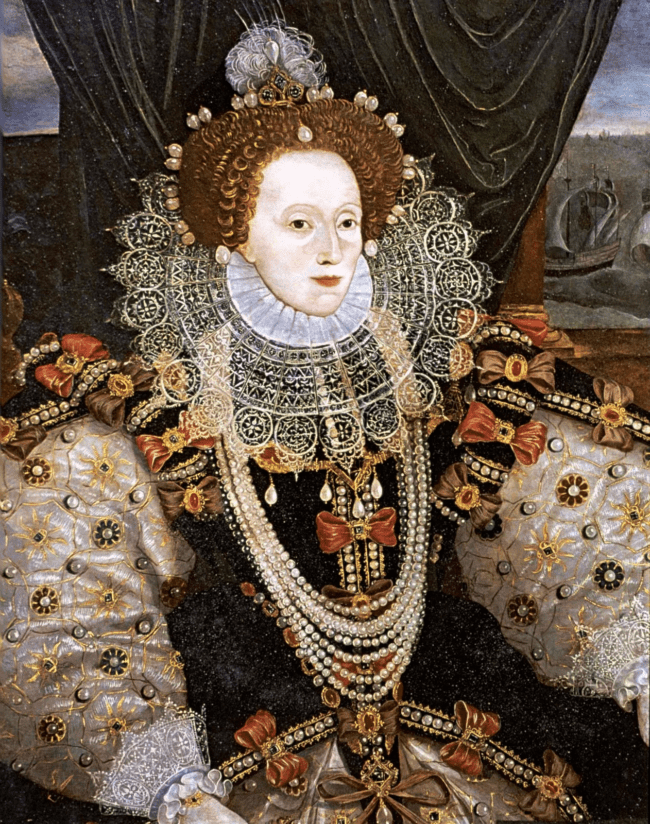
Today’s Leader of Faith
QUEEN ELIZABETH I
Home Call : 24 March 1603
England’s Glorious Monarch, Protestant Supporter, The Virgin Queen, Political and Religious Reformer.
Queen Elizabeth I (1533–1603) ruled England and Ireland from 1558 until her death in 1603 and was the last and the longest reigning monarch of the Tudor dynasty. Known as the Virgin Queen, she never married or left heirs and skilfully maintained authority in a male-dominated world. She played a crucial role in firmly establishing Protestantism in England. After the reign of her Catholic sister, Mary I (Bloody Mary), who persecuted Protestants, Elizabeth reversed the Catholic restoration and re-established the Church of England. She passed the Act of Supremacy, making herself the Supreme Governor of the Church of England, rejecting papal authority, and the Act of Uniformity enforcing the Book of Common Prayer. She promoted English Bible translations and Protestant teachings, allowing figures like John Foxe, to shape England’s Protestant identity. Under her rule, England became a stronghold of Protestantism, influencing later movements like Puritanism and the rise of Evangelical missions. Elizabeth’s 44-year reign provided stability and a strong national identity, earning her lasting admiration as “Gloriana” and “Good Queen Bess”. God chose Elizabeth I as a vessel to shape His people and to deliver them from faith(Catholicism) that did not bring glory to Him. The Lord Himself appointed and established her to govern His people. This was affirmed through the Elizabethan Religious Settlement, which firmly distinguished the Church of England from Roman Catholicism. This enabled the spread of Protestant theology, fostering the growth of Protestant denominations and making England a key hub for missionary activities in later centuries. Many Protestant missionaries from the UK carried the Gospel to various parts of the world, spreading Christianity and revealing the love of Christ to the nations. This period was truly a significant turning point in God’s divine plan for the expansion of His kingdom. She ruled under God’s favour and guidance, effectively resolving all religious disputes. Her reign is considered the Golden Age of England because she made great sacrifices for the nation. As an honourable queen, she demonstrated bold leadership, determination, political wisdom, independence, religious tolerance, discernment, diplomatic skill, and intelligent governance, transforming the kingdom into a respected and powerful nation.
Elizabeth I was born at Greenwich Palace on 7 September 1533 to King of England, Henry VIII and Anne Boleyn. She was initially the heir presumptive. However, after her mother’s execution in 1536, Elizabeth was declared illegitimate and removed from the line of succession. Despite this, she received an exceptional education under tutors like William Grindal and Roger Ascham, becoming fluent in multiple languages, including Latin, French, Greek, and Italian. By her teenage years, she translated classical works and continued her scholarly pursuits throughout her life. Her intelligence and linguistic skills made her one of the most educated women of her time.
King Henry VIII’s first daughter, Mary I, was Catholic because her mother was Catholic. Due to her violent actions, she was known as “Bloody Mary.” She ascended the throne as heir. In contrast, Elizabeth I was a Protestant, born to a different mother. After Wyatt’s Rebellion in 1554, she was imprisoned in the Tower of London. However, in 1555, when it was revealed that Mary’s pregnancy was false, Elizabeth’s position as heir grew stronger. On November 17, 1558, upon Mary’s death, Elizabeth I became queen at the age of 25. She declared her reliance on God’s guidance and wise counsel. Her coronation took place on January 15, 1559, in a grand ceremony. Her reign was crucial in firmly establishing Protestantism in England, distancing the nation from Catholicism. Beyond legal measures, she promoted the spread of English Bible translations and encouraged Protestant literature. She appropriately honored theologians who shaped the doctrine of the Church of England. She enforced strict laws against Catholics, imposing fines on those who refused to attend Anglican services and punishing Catholic priests involved in conspiracies. She strengthened England’s navy, promoted domestic industries, supported Renaissance art, music, and theatre, established an efficient spy network, and transformed England into a major European power.
In her later years, she suffered from depression, especially after the loss of her close friends. She never named a successor. At the age of 71, after ruling unchallenged for 44 years and earning the admiration of her people, she departed to be with the Lord. She was laid to rest in Westminster Abbey. Her legacy was shaped by future generations, and early Protestant worshippers regarded her reign as a Golden Age.
